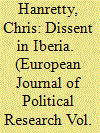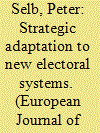| Srl | Item |
| 1 |
ID:
113308


|
|
|
|
|
| Publication |
2012.
|
| Summary/Abstract |
In this article, the non-unanimous decisions of the Portuguese and Spanish Constitutional Tribunals for the periods 1989-2009 and 2000-2009 are analysed. It is shown that judicial dissent can be predicted moderately well on the basis of judicial ideal points along a single dimension. This dimension is equivalent to the left-right cleavage in both Portugal and Spain. The characteristics of the recovered dimension are demonstrated by analysing both the properties of the cases and the properties of the justices who decided them.
|
|
|
|
|
|
|
|
|
|
|
|
|
|
|
|
| 2 |
ID:
113304


|
|
|
|
|
| Publication |
2012.
|
| Summary/Abstract |
The impact of local campaigning on voter choice has been studied within the theme of mobilisation. Grassroots effort can attract votes efficiently, but campaign contact is (potentially) endogenous, so results showing positive effects could be flawed. Experimental solutions to this problem are possible, but could also have low external validity. Drawing on the electoral geography literature, this article suggests that endogeneity concerns can be addressed through so-called 'friends and neighbours voting'. One source of endogeneity is that that candidates may tend to canvass those living close to their own homes, and those canvassed would be expected in any case to be prone to support local candidates. The problem of endogeneity is reframed and treated as an omitted variable bias. Using unique Irish data on the geographic location of the homes of candidates, as well as data on the location of the voters, the analysis confirms that canvassing has a positive impact on candidate choice independent of the effect of geographic distance. More importantly, these two variables interact. The results point to the relevance of the geographic dimension of electoral politics in driving the endogeneity bias in local campaigning studies.
|
|
|
|
|
|
|
|
|
|
|
|
|
|
|
|
| 3 |
ID:
113306


|
|
|
|
|
| Publication |
2012.
|
| Summary/Abstract |
It is well known that different types of electoral systems create different incentives to cultivate a personal vote and that there may be variation in intra-party competition within an electoral system. This article demonstrates that flexible list systems - where voters can choose to cast a vote for the list as ordered by the party or express preference votes for candidates - create another type of variation in personal vote-seeking incentives within the system. This variation arises because the flexibility of party-in-a-district lists results from voters' actual inclination to use preference votes and the formal weight of preference votes in changing the original list order. Hypotheses are tested which are linked to this logic for the case of Belgium, where party-in-a-district constituencies vary in their use of preference votes and the electoral reform of 2001 adds interesting institutional variation in the formal impact of preference votes on intra-party seat allocation. Since formal rules grant Belgian MPs considerable leeway in terms of bill initiation, personal vote-seeking strategies are inferred by examining the use of legislative activity as signalling tool in the period between 1999 and 2007. The results establish that personal vote-seeking incentives vary with the extent to which voters use preference votes and that this variable interacts with the weight of preference votes as defined by institutional rules. In addition, the article confirms the effect of intra-party competition on personal vote-seeking incentives and illustrates that such incentives can underlie the initiation of private members bills in a European parliamentary system.
|
|
|
|
|
|
|
|
|
|
|
|
|
|
|
|
| 4 |
ID:
113309


|
|
|
|
|
| Publication |
2012.
|
| Summary/Abstract |
A previous article in this journal presented a conceptualisation of the political legitimacy of the state and its operationalisation for 72 countries c. 2000. This article provides an updated dataset of state legitimacy for 52 countries c. 2008 using the same conceptualisation. It presents a brief discussion of the comparative results of the two datasets.
|
|
|
|
|
|
|
|
|
|
|
|
|
|
|
|
| 5 |
ID:
113305


|
|
|
|
|
| Publication |
2012.
|
| Summary/Abstract |
How quickly, to what extent and under what conditions do voters and elites adapt to new electoral institutions in order to not waste their votes and effort on hopeless competitors? A latent-curve model of strategic adaptation is developed and fitted to district-level election data from Spain. The extent of strategic adaptation is generally found to vary with the strength of the electoral system. However, grave ethnic tensions are demonstrated to seriously retard adaptation even under favourable institutional conditions.
|
|
|
|
|
|
|
|
|
|
|
|
|
|
|
|
| 6 |
ID:
113307


|
|
|
|
|
| Publication |
2012.
|
| Summary/Abstract |
Twenty years after German reunification, surveys have persistently uncovered differences in political trust between the eastern and western parts of the country. Studies have offered disintegrated and inconclusive assessments of the cross-regional variation. This variation is traced to a tenacious, retrospective sympathy for socialism steeped in political socialisation and experiential learning. Empirical analyses confirm the presence of two key effects. First, retrospective evaluations of socialism not only fuel popular distrust of political institutions, but are more strongly correlated with trust in the east. Second, East-West evaluations of socialism are sufficiently different to contribute towards explaining the contrasting levels of trust between the two regions. That socialist values constitute a core axis upon which East German attitudes pivot presents a challenge for nurturing trust in democratic institutions and renews attention to processes through which supportive attitudes to democracy are acquired in transitional countries.
|
|
|
|
|
|
|
|
|
|
|
|
|
|
|
|